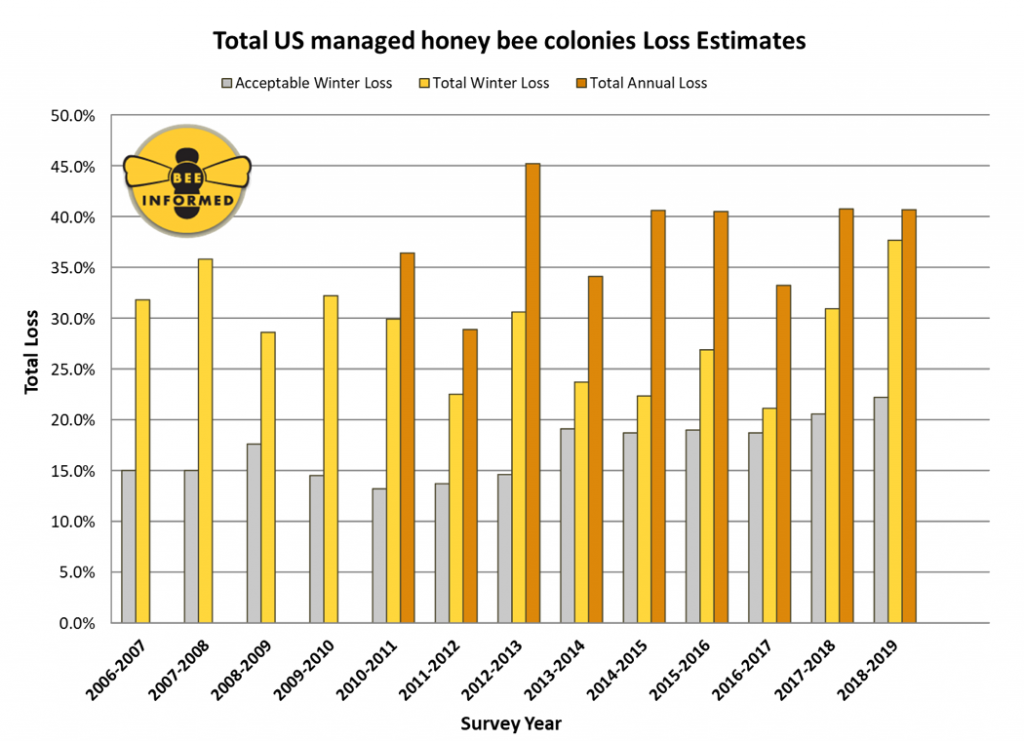The Bee Informed Partnership reports that U.S. beekeepers lost 37.7% of their honey bee colonies last winter. That’s the worst loss since BIP started surveying beekeepers in the winter of 2006–2007:

The biggest threat to bee colony health is varroa mites, which are quickly developing resistance to countermeasures:
The number one concern among beekeepers and a leading contributor to winter colony losses is varroa mites, lethal parasites that can readily spread from colony to colony. These mites have been decimating colonies for years, with institutions like the University of Maryland actively researching ways to combat them. “We are increasingly concerned about varroa mites and the viruses they spread, said [Bee Informed president and U. Maryland entomologist Dennis] vanEngelsdorp. “Last year, many beekeepers reported poor treatment efficacy, and limited field tests showed that products that once removed 90% of mites or more are now removing far fewer. Since these products are no longer working as well, the mite problem seems to be getting worse” [University of Maryland, press release, 2019.06.19].
Bee experts also implicate farming practices and climate change:
“But mites are not the only problem,” continues vanEngelsdorp. “Land use changes have led to a lack of nutrition-rich pollen sources for bees, causing poor nutrition. Pesticide exposures, environmental factors, and beekeeping practices all play some role as well.”
Karen Rennich, executive director for the Bee Informed Partnership and senior faculty specialist at the University of Maryland, elaborated on land use and environmental factors that may be significant in bee colony loss, including increases in extreme weather.
“The tools that used to work for beekeepers seem to be failing, and that may be evident in this year’s high losses. A persistent worry among beekeepers nationwide is that there are fewer and fewer favorable places for bees to land, and that is putting increased pressure on beekeepers who are already stretched to their limits to keep their bees alive,” said Rennich. “We also think that extreme weather conditions we have seen this past year demand investigation, such as wildfires that ravage the landscape and remove already limited forage, and floods that destroy crops causing losses for the farmer, for the beekeeper, and for the public” [U. Maryland, 2019.06.19].
Bruce-based Richard Adee, the world’s largest beekeeper, says he lost 40% to 50% of his colonies this winter. Adee blames pesticides:
A lot of it is the pesticides and neoniconoids and the herbicides. We can’t really protect ourselves from the neoniconoids, which are a pesticide that they plant with the seed that goes into the plant itself. It also gets into the pollen and the nectar. The bees take it back to the hive an it just impacts them; they eat that honey and that pollen during the winter months, and it just kills them off [Richard Adee, transcribed from audio in Jerry Oster, “Record Winter Death Loss in Honey Bee Colonies,” WNAX Radio, 2019.06.21].
Bee Informed hasn’t posted state-level winter loss data yet for 2018–2019, but the winter before, South Dakota reported 22.9% honey bee colony loss. Among BIP survey respondents, we had the fourth-largest number of bee colonies, even though we tied with Nebraska for having the seventh-fewest respondent beekeepers. The USDA says South Dakota ranked fourth in the nation for honey production in 2018, but our production dropped 18% from 2017 to 12.0 million pounds. The value of honey produced in South Dakota in 2018 dropped 21% to $23.7 million.
More than a third of the bees gone! Dont the ag people realize what this means for them? Why aren’t they refusing to buy seeds with neonicoids in them? I don’t get it. smh